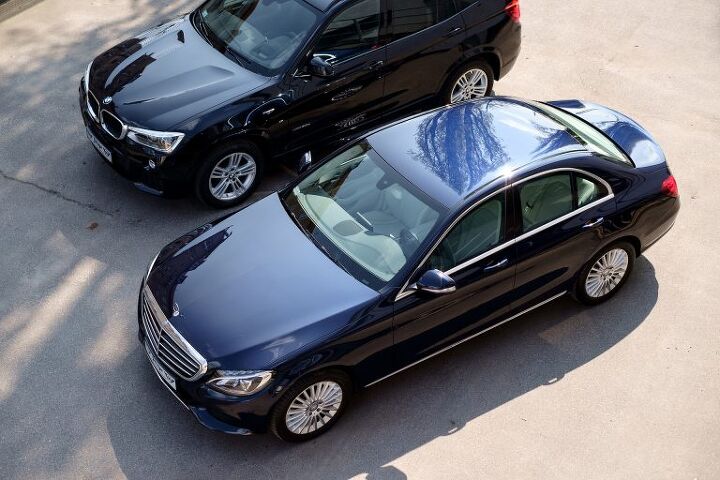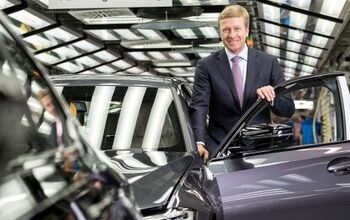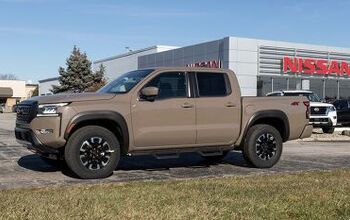BMW and Mercedes-Benz: The Next Automakers to Buddy Up?

Cooperation is commonplace among automakers. Chrysler has worked with, or been purchased by, just about everyone at this point, but it’s far from the only manufacturer to get chummy with a rival company. Ford and Volkswagen are busy discussing their future together and Toyota tapped other brands to help it co-develop performance models like the 86 and Supra.
Despite their longstanding and occasionally bitter rivalry, Mercedes-Benz and BMW could be the next duo to cozy up to one another. According to German outlet Handelsblatt, BMW chairman Harald Krüger and Daimler management board member Ola Källenius are currently examining the possibility of an automotive alliance.
The primary goal would be the joint absorption of billions in development costs and the establishment of a common industry standard for autonomous vehicles. However, self-driving tech appears to be a secondary issue. With the margins (and demand) for small cars looking slimmer than ever, the pair are considering developing next-generation compact cars together — most likely starting with the 1 Series and A-Class. Insiders informed on the matter believe shared development and manufacturing of the models could save the companies billions.
The prospective fruits of such an endeavor would need years to ripen. Daimler just released its new A-Class a few months ago, while the 1 Series saw a revamp only a year earlier in China. Neither car is due for an update for some time, and any new compact architecture wouldn’t come into play for at least a few more years. Handelsblatt claimed 2025 at the earliest.
Both automakers also seem concerned with the cost of developing autonomous systems capable of keeping up with the big boys in Silicon Valley. While other automakers have made meaningful headway, GM is not quite the industry leader it once seemed, and the rest of the field has settled in a gray area or simply abandoned the race. It’s no longer obvious who exactly is leading the charge into autonomy. Still, tech companies have soldiered on in the hopes that they can one day provide inexpensive alternatives to car ownership. Part of the preliminary talks between BMW and Mercedes-Benz involve how to avoid financial disaster if and when that day comes.
“Those who are the first to dominate autonomous driving, who are the first to offer a functioning autonomous taxi fleet, occupy a huge market,” said Dietmar Voggenreiter of the consulting firm Horváth & Partners. “In the US, Waymo and Uber are hard to beat as platform operators,” he continued, “but in Europe, roles are not yet dispersed.”
While the pair already cooperate loosely via Daimler’s Car2Go and BMW’s DriveNow, both short-term rental programs, joint development and production would be new ground for the pair.
Currently, both find themselves part of an ongoing European investigation into whether the duo were part of a larger automotive cartel that worked together to manipulate the prices of automotive parts. That, plus other unsavory accusations (some of which pitted BMW and Mercedes against each other), could make the companies choose to keep their distance.

A staunch consumer advocate tracking industry trends and regulation. Before joining TTAC, Matt spent a decade working for marketing and research firms based in NYC. Clients included several of the world’s largest automakers, global tire brands, and aftermarket part suppliers. Dissatisfied with the corporate world and resentful of having to wear suits everyday, he pivoted to writing about cars. Since then, that man has become an ardent supporter of the right-to-repair movement, been interviewed on the auto industry by national radio broadcasts, driven more rental cars than anyone ever should, participated in amateur rallying events, and received the requisite minimum training as sanctioned by the SCCA. Handy with a wrench, Matt grew up surrounded by Detroit auto workers and managed to get a pizza delivery job before he was legally eligible. He later found himself driving box trucks through Manhattan, guaranteeing future sympathy for actual truckers. He continues to conduct research pertaining to the automotive sector as an independent contractor and has since moved back to his native Michigan, closer to where the cars are born. A contrarian, Matt claims to prefer understeer — stating that front and all-wheel drive vehicles cater best to his driving style.
More by Matt Posky
Latest Car Reviews
Read moreLatest Product Reviews
Read moreRecent Comments
- Slavuta Autonomous cars can be used by terrorists.
- W Conrad I'm not afraid of them, but they aren't needed for everyone or everywhere. Long haul and highway driving sure, but in the city, nope.
- Jalop1991 In a manner similar to PHEV being the correct answer, I declare RPVs to be the correct answer here.We're doing it with certain aircraft; why not with cars on the ground, using hardware and tools like Telsa's "FSD" or GM's "SuperCruise" as the base?Take the local Uber driver out of the car, and put him in a professional centralized environment from where he drives me around. The system and the individual car can have awareness as well as gates, but he's responsible for the driving.Put the tech into my car, and let me buy it as needed. I need someone else to drive me home; hit the button and voila, I've hired a driver for the moment. I don't want to drive 11 hours to my vacation spot; hire the remote pilot for that. When I get there, I have my car and he's still at his normal location, piloting cars for other people.The system would allow for driver rest period, like what's required for truckers, so I might end up with multiple people driving me to the coast. I don't care. And they don't have to be physically with me, therefore they can be way cheaper.Charge taxi-type per-mile rates. For long drives, offer per-trip rates. Offer subscriptions, including miles/hours. Whatever.(And for grins, dress the remote pilots all as Johnnie.)Start this out with big rigs. Take the trucker away from the long haul driving, and let him be there for emergencies and the short haul parts of the trip.And in a manner similar to PHEVs being discredited, I fully expect to be razzed for this brilliant idea (not unlike how Alan Kay wasn't recognized until many many years later for his Dynabook vision).
- B-BodyBuick84 Not afraid of AV's as I highly doubt they will ever be %100 viable for our roads. Stop-and-go downtown city or rush hour highway traffic? I can see that, but otherwise there's simply too many variables. Bad weather conditions, faded road lines or markings, reflective surfaces with glare, etc. There's also the issue of cultural norms. About a decade ago there was actually an online test called 'The Morality Machine' one could do online where you were in control of an AV and choose what action to take when a crash was inevitable. I think something like 2.5 million people across the world participated? For example, do you hit and most likely kill the elderly couple strolling across the crosswalk or crash the vehicle into a cement barrier and almost certainly cause the death of the vehicle occupants? What if it's a parent and child? In N. America 98% of people choose to hit the elderly couple and save themselves while in Asia, the exact opposite happened where 98% choose to hit the parent and child. Why? Cultural differences. Asia puts a lot of emphasis on respecting their elderly while N. America has a culture of 'save/ protect the children'. Are these AV's going to respect that culture? Is a VW Jetta or Buick Envision AV going to have different programming depending on whether it's sold in Canada or Taiwan? how's that going to effect legislation and legal battles when a crash inevitibly does happen? These are the true barriers to mass AV adoption, and in the 10 years since that test came out, there has been zero answers or progress on this matter. So no, I'm not afraid of AV's simply because with the exception of a few specific situations, most avenues are going to prove to be a dead-end for automakers.
- Mike Bradley Autonomous cars were developed in Silicon Valley. For new products there, the standard business plan is to put a barely-functioning product on the market right away and wait for the early-adopter customers to find the flaws. That's exactly what's happened. Detroit's plan is pretty much the opposite, but Detroit isn't developing this product. That's why dealers, for instance, haven't been trained in the cars.


































Comments
Join the conversation
BMW are using a FWD MINI platform for the 1 series, Merc are using a Renault compact hatchback for the A class. Pairing MINI and Smart (the forFour shares a platform with a sub-compact Renault) might be a 'smart' idea too....
Don’t Greeley own some of Mercedes now? If so where would this leave Volvo? Or would it be a threesome?